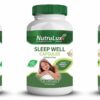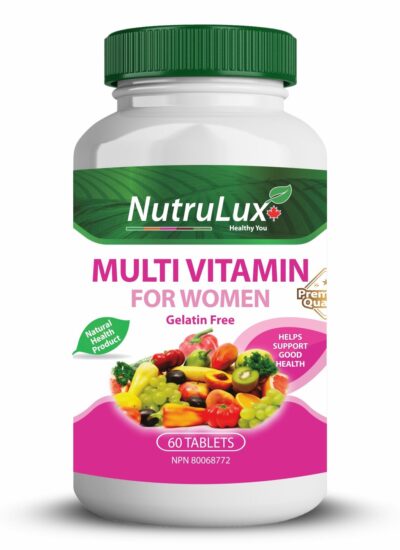
Sleep Well ( 60 mg Vitamin C ) Halal Gelatin Free Capsules
$19.99
Sleep should be relaxing, but many struggle to get the recommended seven or more hours per night of shut-eye. Considering the serious consequences of not sleeping enough — including reduced performance, and increased risk of cardiovascular disease, cancer, diabetes, high blood pressure, and car accidents — it is no surprise that many people turn to sleep aids to help them rest.
Our sleep supplements are designed to help you fall asleep and stay asleep, so you can wake up feeling healthy, refreshed, and ready to take on the day.
Recommended dose: Adults: 2 Capsule(s) 1 time(s) per day TAKE 2 CAPSULES ONCE A DAY BEFORE BED-TIME.
Duration of use: Consult a healthcare practitioner if sleeplessness persists continuously for more than 3 weeks (chronic insomnia) and for product use beyond 6 months.
Recommended use: Sleep aid to help promote sleep and relieve nervousness. Chamomile is (Traditionally) used in Herbal Medicine as a calmative and/or sleep aid. Valerian is (Traditionally) used in Herbal Medicine as a sleep aid / (to) help(s) to promote sleep. Hops is (Traditionally) used in Herbal Medicine to help relieve nervousness (sedative and/or calmative). Ashwagandha is traditionally used in Ayurveda as a sleep aid.

Buy 1 & Get 1 Free
Description
Natural sleep aids are over-the-counter supplements intended to help you fall asleep faster or stay asleep throughout the night. They are usually plant-based, a vitamin or mineral already present in our diets, or supplemental amounts of something produced by the body. There are not strict guidelines surrounding the use of the word “natural” for supplements, and many natural supplements, such as melatonin, tend to be synthetically derived. Many customers prefer natural sleep supplements because they tend to have fewer side effects than prescription sleep medications. They also appeal to people who prefer natural products or are concerned about the addictive potential of prescription sleep aids.
Sleep should be relaxing, but many struggle to get the recommended seven or more hours per night of shut eye. Considering the serious consequences of not sleeping enough — including reduced performance, and increased risk of cardiovascular disease, cancer, diabetes, high blood pressure, and car accidents — it is no surprise that many people turn to sleep aids to help them rest. While prescription and over-the-counter drugs are one option, natural sleep aids are also popular. Getting the details about the types of natural sleep aids, their potential benefits and downsides, and how they are regulated can help you make informed decisions about using and purchasing these products. Many people regularly miss out on the recommended seven-plus hours of sleep a night. Beyond cranky mornings and coffee cravings, sleeplessness can have real impacts on health, as rest is essential to brain function, immunity, muscle repair, metabolic health, and much more.
How to pick a sleep supplement & what we look for:
Anyone in the market for a new sleep supplement knows how tricky it can be to cut through all the labels, claims, and ingredient lists on various products.
- It has science-backed ingredients: The ingredient label is always the first thing you’ll want to look at in a sleep supplement. It should feature active ingredients that are backed by sleep-relevant science and dosed properly. We broke down what those are below to make your search easy breezy.
- It comes in an effective but gentle form: Since you’ll presumably be taking this supplement every night, you’ll want to make sure it’s gentle on the stomach. Look for ingredients that have been studied on humans in clinical trials. The higher the bioavailability (the percentage of supplement that actually makes it into the bloodstream), the better.
- It comes in a convenient serving size: Be it a capsule, spray, or tincture, the supplement should be easy and enjoyable to consume nightly.
- Its ingredients justify the cost: The most affordable sleep supplements tend to contain a single active ingredient. Formulas that are more expensive should feature high-quality, clean ingredients (e.g., organic, higher bioavailability, botanical extracts, etc.) paired with additional premium nutrients or botanicals.
- It contains few other ingredients: The shorter the “other ingredients” list, the better. You’ll want a supplement that contains actives and not much else, so look for one free of binders, preservatives, and artificial colors or flavors. Looking for allergen-free supplements made without gluten, eggs, dairy, soy, peanuts, tree nuts, etc., is also a smart move.
- It comes from a trusted brand: Buy from a brand that’s transparent about its ingredients, sourcing, and quality testing. Above and beyond practices would include independent third-party testing (which helps ensure the purity and potency of a product) and/or USDA-certified organic seal. If the company has committed to sustainable packaging and/or shipping practices, all the better.
Top sleep supplement ingredients:
Remember how science-backed ingredients are the most important things to look for? That’s because there are lots of ingredients that are labeled as sleep promoters but don’t have the data to demonstrate they work. This isn’t necessarily because supplement companies are trying to dupe you but more likely because long-term, rigorous research is wildly expensive. While pharmaceutical companies have the budget to spend on them, smaller supplement brands usually don’t (and nutrition research is a less-funded area in general). As such, they typically rely on the collective body of science from smaller, more modestly priced studies. When you’re looking for a sleep supplement, you can be confident that the following ingredients do have at least some (and in some cases, lots) of research to back them up:
- Magnesium bisglycinate: This form of the essential mineral magnesium is attached to two glycine molecules to make it more bioavailable, gentle, and easy for the body to absorb come bedtime. Supplementing with magnesium has been shown to help with slumber; for example, this double-blind randomized clinical trial demonstrated that this mineral helps older adults fall asleep faster and stay asleep longer.
- Jujube seed extract (Ziziphus jujuba var. spinosa): Jujube dates have long been used for relaxation and sedation in traditional Chinese medicine, and one 2017 scientific review of the fruit—which can also be found in a concentrated powder extract form—supports its potentially calming effect on the brain.
- Gamma-aminobutyric acid (GABA): A naturally occurring neurotransmitter, GABA sends the brain a signal to calm down. GABA supplement bioactive (made by a fermentation process) that has been shown in clinical trials to enhance natural sleep quality.
- L-theanine: L-theanine is an amino acid found naturally in green tea, but the kind you’ll find in supplements is often synthetic. Due to the way it blocks receptors in the brain that can initiate a stress response, it’s been found to support sleep and cognitive function and calm stress in healthy adults. A dose of 200 mg is the minimum amount of L-theanine you’ll want to take to get these calming sleep effects, according to a 2020 systematic review.
- Tart cherry extract (Prunus cerasus): In one double-blind, placebo-controlled study on 40 people over seven days, tart cherry juice concentrate, a natural source of melatonin, enhanced sleep efficiency when enjoyed before bed.
- 5-Hydroxytryptophan (5-HTP): 5-HTP is a naturally occurring amino acid that produces serotonin, which can then be converted to melatonin in the body. Supplemental forms of it have shown potential in supporting a steadier mood. Again, plant-derived forms of it, from the seeds of the African plant Griffonia simplicifolia, are superior to synthetic ones. When taking a 5-HTP supplement, make sure it also contains some vitamin B6 (also might be labeled pyridoxal 5′-phosphate) to help catalyze the conversion to serotonin.
- Melatonin: Melatonin is a hormone that our bodies secrete at night to signal that it’s time to go to sleep. As such, melatonin supplements may be temporarily helpful for adjusting to a bedtime your body is not used to (like when you’re acclimating to a new time zone). However, there is limited evidence that melatonin improves sleep quality on an ongoing basis, and it’s not marketed as a nightly supplement in most countries outside the U.S. and Canada.
How it helps:
- Enhances sleep quality*
- Supports a healthy circadian rhythm*
- Promotes a steady state of relaxation*
- Non-hormonal sleep aid























